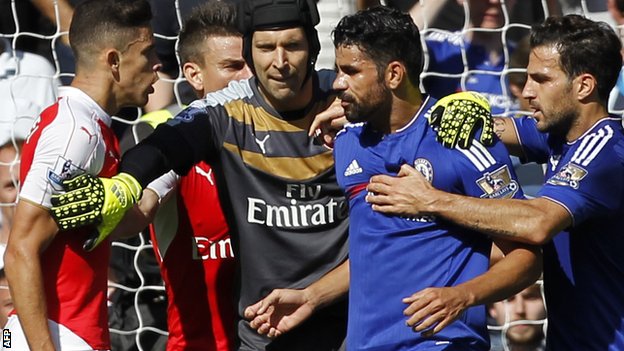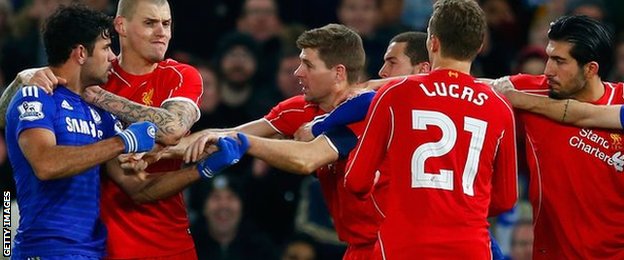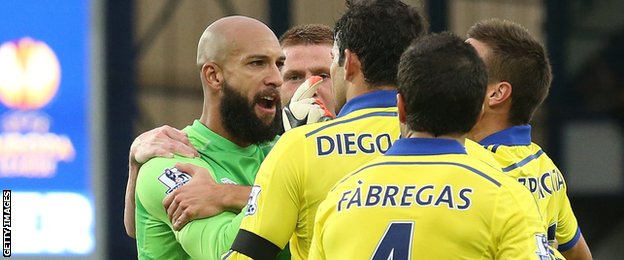
Gabriel (left) was given a second yellow card for kicking out at Diego Costa (second right) after a lengthy argument with the striker
Diego Costa: Chelsea’s ‘serial offender’ a vital figure
Diego Costa has made a convincing play to be the Premier League's most divisive figure since his arrival from Atletico Madrid in the summer of 2014 – but rarely has opinion been so split as after his part in Chelsea's 2-0 win against Arsenal at Stamford Bridge.
From the first whistle Costa, typically, was right in the face of Gabriel and Laurent Koscielny and willing to fully engage in the physical and verbal battles.
He did not have a chance worthy of the name but his presence alone is as much a psychological threat as a footballing one even when the force is not with him.
The verdict was reached along predictable lines. Chelsea manager Jose Mourinho praised Costa as his man of the match and likened his spirit and passion for combat to the warriors on show in the Rugby World Cup.
Arsenal counterpart Arsene Wenger accused the 26-year-old of being a serial offender with the knack of escaping punishment, as he did on Saturday after pushing Gunners defender Koscielny in the face before provoking Gabriel into the kick that led to his red card.
And in that one flashpoint, one he somehow walked away from without a red card, he prompted the moment that could almost count as Chelsea's match-winner.
So what makes Costa such a compelling and controversial figure?
Costa remains vital to Chelsea
Diego Costa was man of the match – Mourinho
Costa may have made a slow start compared to last season – but his importance to Chelsea was demonstrated again as his threatening influence and menacing attitude managed to eventually unsettle an Arsenal defence that was coping well.
The stats also prove Costa is not having the same impact as last year. After six league games last season he had scored eight goals as Chelsea put down a marker on the way to reclaiming the Premier League title. This season he has only one goal and eight shots on target compared to 18 last season.
And yet, in Chelsea's time of trouble, Mourinho still clearly regards him as the man to lead the fightback – even when he stretches rules to the limit and, too often, beyond.
Diego Costa stats in the first six games
|
||||||
|---|---|---|---|---|---|---|
| Season | Goals | Assists | Tot. Shots | Shots on Target | Accuracy (%) | Conversion Rate (%) |
|
2014-15 |
8 |
0 |
18 |
15 |
83.33 |
44.44 |
|
2015-16 |
1 |
1 |
8 |
4 |
50 |
12.5 |
Mourinho also stretched reality to claim Costa was the game's best player but he undoubtedly made the defining contribution, provoking Gabriel into the kick that reduced Arsenal's numbers and swung the game irreversibly in Chelsea's favour.
He was "man of the match" but certainly not the game's best player.
Costa was eventually substituted by Mourinho, perhaps with preservation in mind as Santi Cazorla had just seen Arsenal's second red card and the atmosphere was ticking once more.
The goals have yet to come and Costa barely had a chance worthy of the name – but the standing ovation Stamford Bridge's anti-hero received as he was substituted proved he retains his status as a cult figure.
The good news for Chelsea is that Costa lasted the pace well and several second-half sprints suggested the hamstring problems he has suffered both at Atletico and Chelsea are currently under control.
Mourinho must now hope that as Chelsea improve the goals will follow.
Costa’s bad reputation is deserved
Arsenal manager Wenger made no attempt to hide his disgust at Costa's behaviour – and his bemusement that a player who treads the thin line between the legal and the illegal somehow escapes detection and punishment on such a regular basis.
As usual, Costa was looking for conflict from the first whistle but it reached a peak when he shoved his hand into the face of Arsenal defender Koscielny three times, then knocked him to the ground.
Gabriel's attempt to defend his team-mate ended with a yellow card and a continued dialogue Costa was more than happy to engage in before that kick-out sent the Chelsea striker demanding punishment from referee Mike Dean.

Costa was banned for three matches for stamping on Liverpool's Emre Can in Chelsea's League Cup semi-final fixture last season
Costa somehow escaped with only a yellow card, to the understandable fury of Wenger, who claimed he will be acting in the same manner next week – and getting away with it again.
He certainly has form for provocation and yet the stats revealed he was not penalised once by referee Dean despite appearing to be a central figure in most of the game's confrontational moments.
Shortly after signing for Chelsea he was furiously confronted by Everton keeper Tim Howard for taunting defender Seamus Coleman following his own goal in the 6-3 win at Goodison Park.
Costa was banned retrospectively for three games in January after stamping on Liverpool's Emre Can in the League Cup semi-final at Stamford Bridge. He also had to be separated from Yohan Cabaye, then at Paris St-Germain, by officials of both clubs at the end of the Champions League tie when Chelsea went out in the last 16 last term.

Everton keeper Tim Howard confronted Costa after the striker appeared to taunt Seamus Coleman
In the same game at Stamford Bridge he was also lucky to escape when he pushed PSG defender Marquinhos to the floor when referee Bjorn Kuipers had his back turned to the play.
Costa shows no sign of letting up – and Mourinho shows no sign of accepting the striker needs to remove his willingness to challenge authority from his game.
And yet, for all this, his disciplinary record since joining Chelsea is not exactly horrific, with 10 yellow cards and no reds (retrospective ban notwithstanding) in 44 league games.
Wenger clearly believes he is either being treated too leniently or is a master of disguise – whether the Football Association or officialdom now chooses to take a heavier line with Costa remains to be seen.
Time for officials to get tough on Costa?
Arsenal manager Wenger clearly believes so – and you suspect every other manager in the Premier League apart from Mourinho would agree.
His delight with Costa seemed partly a response of defiance against Wenger's "moaning" as he called it – but it is clear the Gunners boss has a point.
Costa's approach is crucial to the siege mentality Mourinho loves to foster but his brushes with authority have become almost a weekly occurrence since moving from La Liga.
And his behaviour against Arsenal was a prime example. He had the bait out for Arsenal's defenders from the first whistle and eventually Gabriel, in a moment of crass stupidity, took it hook, line and sinker. Gabriel knew what was coming but still fell into the trap.
Costa behaviour disgusting – Wenger
As he made his way off, however, Gabriel and his Arsenal colleagues had every right to ask how Chelsea's man of war was somehow still on, with only a yellow card for his troubles.
Costa is, as Wenger says, a serial offender. The usual term is "a handful" but too often the line is crossed and too often he seems to escape, matters made worse when the law comes down hard on his opponents as it did with Gabriel.
Wenger's suggestion that the striker will be repeating the tricks at Newcastle United next week and still staying on the right side of officialdom may also have been a plea for referees to finally crack down on Costa.
He was a lucky man on Saturday – and if he carries on in the same manner his luck should run out.
